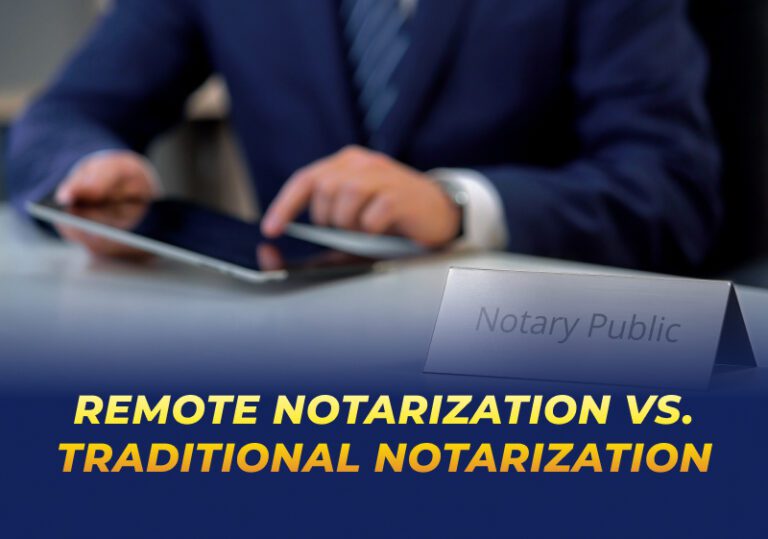The advent of novel technological tools in the realm of notarizations has introduced a degree of perplexity for numerous individuals, including those in the realm of Notaries. Within this context, there exists a triad of distinct approaches: remote online notarization (RON), in-person electronic notarization (IPEN), and remote ink-signed notarizations (RIN). Each of these diverges from the conventional modality of notarizations involving pen-and-paper procedures.
Herein, we offer a comprehensive delineation of the distinctions among these various notarization methodologies. It is important to note that while the following represents a broad overview, precise stipulations may differ in certain jurisdictions.
Examination of Each Notarization Type:
Traditional Notarization: This form encapsulates the traditional and familiar approach, where the signer and Notary convene physically, conducting face-to-face interactions to notarize a handwritten signature on a tangible paper document.
In-Person Electronic Notarization (IPEN): In this case, the Notary and signer continue to meet in person; however, the medium shifts from pen-and-paper to electronic signatures. An electronic document (often referred to as an “electronic record” in accordance with state legislation) is signed and notarized via electronic signatures within this context.
Remote Online Notarization (RON): RON leverages the capabilities of audio-visual communication technology (Zoom or Skype) to facilitate remote interactions between the Notary and signer, who are situated in disparate locations. The notarization process transpires remotely through the use of electronic signatures and records.
Remote Ink-Signed Notarization (RIN): Introduced as an alternative during the COVID-19 crisis, RIN represents a departure from the necessity of in-person paper-based notarizations. At present, seven states have enshrined laws to formally recognize RIN notarizations. In a RIN procedure, the signer endorses a paper document while engaging in live online communication with the Notary. The signer might be obligated to furnish a declaration, under penalty of perjury, attesting to the congruence of the signed document with the version forwarded to the Notary. The document is subsequently transmitted to the Notary for notarization.
Document Format Requisites for Each Notarization Type:
Traditional notarization mandates a tangible paper document with an original handwritten signature executed in ink.
In-person electronic notarization necessitates an electronic record, often in PDF or Word format, displayed on a computer, laptop, or mobile device.
Remote online notarization generally aligns with IPEN regarding electronic records. However, certain states accommodate the option of paper documents for signing and notarization within the RON framework.
RIN demands a physical paper document bearing an original handwritten signature, potentially coupled with an electronic duplicate of the document forwarded to the Notary.
Signer Identification Protocols:
Both traditional and in-person electronic notarizations adhere to analogous procedures for signer identification. The signer is required to possess personal knowledge or present satisfactory identity verification, typically in the form of a driver’s license, or through credible witnesses familiar with the signer and authorized to vouch for their identity, adhering to state Notary regulations.
Remote online notarization employs a multifaceted approach involving at least two identity verification methods, specifically tailored for the remote environment. This may include knowledge-based authentication (KBA), credential analysis, remote presentation of identification, biometrics, or a public key certificate.
RIN necessitates a state-approved identification process, which could involve the Notary’s personal acquaintance with the signer, remote presentation of identification to the Notary, or an oath/affirmation from a credible witness participating in the RIN procedure.
Notary Signatures and Seals:
In the conventional notarization process, the customer applies a pen-and-ink signature to the paper document. Subsequently, the Notary completes the certificate verbiage, appends their signature using pen and ink, and affixes their physical Notary seal.
In IPEN, the customer adopts an electronic signature for the electronic document, achieved by clicking a mouse or employing a signature pad. The Notary follows suit, utilizing an electronic signature for the notarial certificate, accompanied by an electronic seal.
In remote notarizations involving electronic documents, the customer employs an electronic signature for the electronic document. The Notary replicates this process by utilizing an electronic signature for the notarial certificate, coupled with an electronic seal.
Within the RIN context, following online interaction with the Notary, the signer dispatches the paper document to the Notary via mail or, if permitted by state regulations, fax or electronic transmission. Upon receipt, the Notary conducts the notarial act on the physical document, subsequently returning it to the signer via mail, fax, or electronic transmission.
Recording Journal Entries:
Dependent on state laws, traditional and IPEN notarizations prompt the Notary to document the notarization event within a physical bound journal or, in certain jurisdictions, an electronic journal.
Remote notarizations typically mandate the use of an electronic journal entry, and the notarization procedure is recorded utilizing audiovisual technology. The Notary is obligated to securely retain the recording, in conjunction with any other journal-related information stipulated by state legislation.
In the case of RIN, it is advisable for the Notary to uphold journaling practices, even if not mandated by law. Furthermore, creating a recording of the entire RIN audiovisual conference, along with its backup, is recommended, notwithstanding legal requirements. Some states may impose supplementary recordkeeping obligations.



